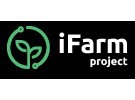iFarm, in cooperation with Poteha Labs and developers from Catalyst-Team, have started a Telegram bot for identifying deviations in crops growth in vertical farms: a neural network with the help of the latest discoveries in the sphere of computer vision analyses the state of plants and the bot will provide all the needed information on it.
The working mechanism is relatively simple: a farm associate, having seen a plant that does not look healthy, takes a photo of it on the phone camera and sends it to the Telegram bot in order to identify a possible reason for the deviation in plant development. The neural network determines the presence of anomalies and sends a response via the application.
“In future it is planned to integrate the system in all production units using iFarm technologies. The data on the quality of seedlings will be collected with a special autopilot drone. It will allow reacting quickly to any deviations in plant development, stopping disease spreading and preventing crop losses, which in turn will make the iFarm growing technology even more reliable”, commented Product Director, Mr. Oleg Kostenko.
“At Poteha Labs we develop and implement machine learning technologies. The accumulated internal expertise and the fact that we attract the best specialists in the market, allow us to provide clients with the most efficient products. For the iFarm bot creation, we addressed Mr. Sergey Kolesnikov from Catalyst-Team. Their similarly-named Catalyst library is perfectly suitable for the development of solutions for such an advanced company as iFarm”, commented the Executive Director of Poteha Labs, Mr. Ivan Ryabkov.
According to Mr. Ryabkov, due to cooperation of all parties, high precision data has been reached. “There is 97% accuracy on the graph, which means that in 97 of 100 cases the model has defined the state of the plant correctly, in the same manner as a plant breeder would. With that, the model can be additionally taught on new data and the efficiency can be improved in future”, explained Mr. Ivan Ryabkov.
“The purpose of our cooperation is to use the best practices in machine learning (deep learning, DL) and expertise of the Catalyst-Team in the sphere of computer vision (CV) for the creation of an assistant bot for an iFarm agronomist”, mentioned Mr. Sergey Kolesnikov.
"Data preparation is an important stage of every research and development in deep learning. We have been following the best practices of software engineering, garbage in – garbage out, in order to check the research concept, when the sets of available data are very limited, their creation and preparation can have a major effect.
"The first issue was diversity of presented data: we had close up photos, and those made of the whole shelf with all crops at once. However, when we are teaching the neural network to recognize the state of the plant on photos, we need something in between the two extremes. Thus, we have determined what exactly needs to be on a photo and at what distance it should be taken in order for the Telegram bot to return the information corresponding with the reality.
"The most interesting part of any data science project is testing all the possible hypotheses and conducting multiple experiments. That is where we needed the assistance of Catalyst.Ecosystem or Catalyst itself, to be precise, together with our new Alchemy project.
"Combining all our experience, Catalyst-Team together with iFarm in two weeks have worked out the first concept of the solution, collected the feedback from agronomists and have improved the product several times with regards to the specifics of its application. The work over the project in all took less than two months over which the number of crops available for analysis has been increased and five classes of romaine lettuce and bok choy have been identified: a healthy plant, a sick plant, sporulation on effected areas, marginal blight, another crop."

 iFarm
iFarm